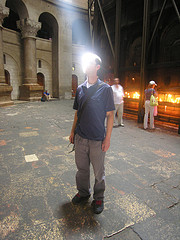 The Holy Bible is a treasure of hidden treasures, written in a very deliberate way, through pens called men, by the Holy Spirit. The languages used in its writing were deliberately created by God; to reveal the word of God. Furthermore, in His sovereignty, God determined that it was good to hide things.
The Holy Bible is a treasure of hidden treasures, written in a very deliberate way, through pens called men, by the Holy Spirit. The languages used in its writing were deliberately created by God; to reveal the word of God. Furthermore, in His sovereignty, God determined that it was good to hide things.
It is the glory of God to conceal a matter,
But the glory of kings is to search out a matter. Proverbs 25:2
God works all things to good; even the fallacies of man. Over the ages, godly men have done their best to surrender to the Holy Spirit’s leading in collecting and translating the Holy Scriptures into the other languages of man. It is understandable that even the most inspired and insightful endeavors were influenced by their culture, and their personal way of thinking. It would serve us well to assume that the same is true for those of us that are reading those translations.
Before I get in trouble with you, let me say that this is not about the validity or perfection of the Holy Bible. The Lord’s encouragement in this article is for our desperate need to read the translations we prefer with a heart to search out the matter; with at least a mild suspicion that things might not be what they seem. It is not a matter of the infallibility of the Scriptures; but of the paradigms of both translator and seeker of the truth.
To better explain, let me share something I discovered in reading a short passage in 2Thessalonians (using my favorite translation, the New King James Version).
But the Lord is faithful, who will establish you and guard you from the evil one. And we have confidence in the Lord concerning you, both that you do and will do the things we command you. Now may the Lord direct your hearts into the love of God and into the patience of Christ. 2Thessalonians 3:3-5
The first thing that caught my attention – because I had seen it before – was the inclusion of “one” at the end of the first sentence. It doesn’t exist in the Greek manuscripts. Therefore, we can read and understand that it is “from the evil” which we are guarded by the Lord.
Now, the evil (ponēros) may be from Satan, but based on the definition, the verse is speaking of something other than a being.
Evil (ponēros): Full of labours, annoyances, hardships; pressed and harassed by labours; bringing toils, annoyances, perils; of a time full of peril to Christian faith and steadfastness; causing pain and trouble; bad, of a bad nature or condition; in a physical sense: diseased or blind; in an ethical sense: evil, wicked, bad.
I think you will agree, this is more a description of condition than personage.
As with many Greek words, the definition of ponēros is broad; requiring a Teacher that can give us the heavenly meaning. For myself – and you must hear for yourself – “the evil” is the condition of rebellious mankind; the core and foundation of our enmity with God.
Obviously, the translators had a different perspective. Perhaps they were lead by the Holy Spirit to insert “one” at the end of the sentence. It is certainly possible that I am missing something. If the Teacher shows you something different, please let me know.
My second discovery lies in the end of the passage: “the patience of Christ”. Here, we see the effect of culture in our understanding of Scripture. Take a look at the definition of patience.
Patience(hypomonē): Steadfastness, constancy, endurance; in the NT the characteristic of a man who is not swerved from his deliberate purpose and his loyalty to faith and piety by even the greatest trials and sufferings; patiently, and steadfastly; a patient, steadfast waiting for; a patient enduring, sustaining, perseverance.
This is nowhere near my understanding of “patience”. Patience to me is something like passively putting up with an uncomfortable situation or person. “The patience of Christ”, in which our hearts are being directed by the Lord, is something much stronger and active. In this case, it is my paradigm that needs an adjustment.
BTW: This stronger meaning of “patience” is found in thirty-two other verses. Here is a link to the list of them in blueletterbible.org (my favorite searching it out resource).
To close, let’s go back to the purpose of this article. The Lord is encouraging us in two things. First, there is our desperate need to read the translations we prefer with a heart to search out the matter. Searching is not a passive experience. It is an active adventure. The Holy Spirit is waiting to guide us into all truth. Set aside the time to search out the treasures’ deeper meaning and value. Share what you discover with someone else.
Second, God would have us develop at least a mild suspicion that things might not be what they seem. Recognize and accept that the passage you are reading may not mean what you think it means. Start with your favorite passages. Find the deeper meaning in the language God created to express His word. Don’t be afraid to have your paradigm shaken and shifted. Don’t guard your mind from the renewal it needs.
May all your kingdom adventures be filled with God’s presence and pleasure. May you enjoy abounding excitement, and find the truth that expels all your fears.
Humbly Yours and Forever His,

